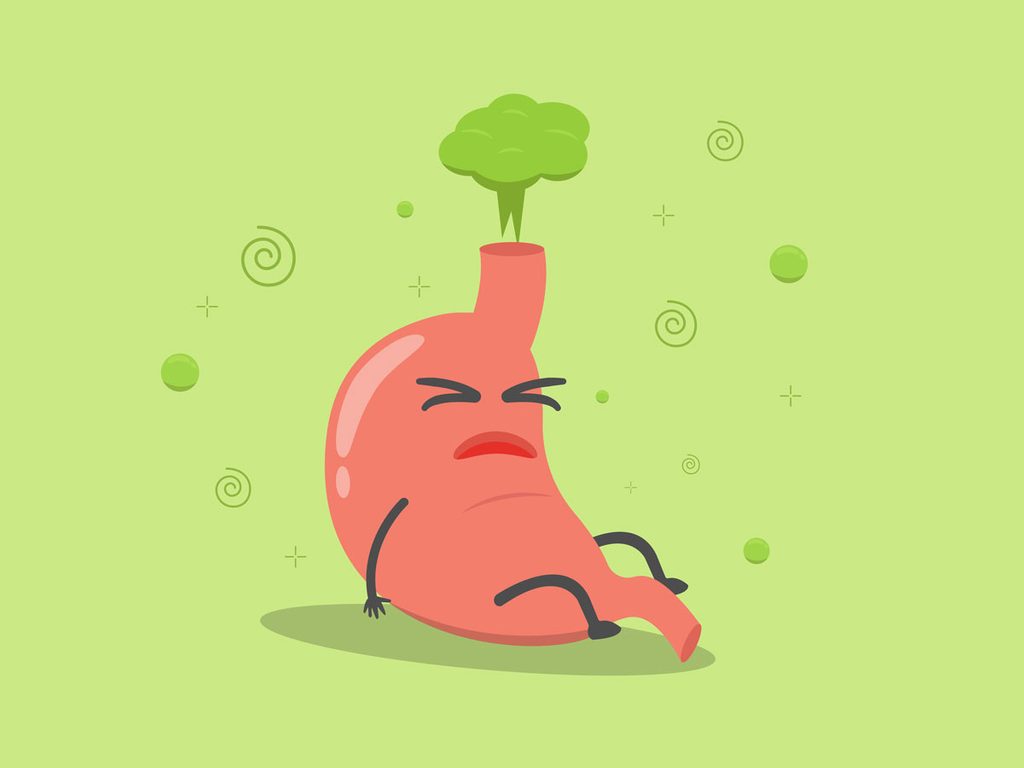Why You Keep Passing Gas and What to Do About It

Get over talking about gas. If you're suffering from painful or sudden excessive flatulence, you need to get to the bottom of things, stat.
I’ll never forget the time I had to evacuate a packed streetcar. On the way to work, at the height of rush hour, someone had passed a nuclear-sized fart. The smell was so potent that, for a few seconds, I couldn’t breathe. Many people gagged. Horrified, all of the passengers got off, except for one guy – presumably the culprit.
While malodorous and, in some cases, a passion killer (when your partner lets it rip under the covers while you’re getting busy), most intestinal gas is harmless – and even a sign of a healthy lifestyle. “Farting, in itself, is not pathological,” says Tamara Freuman, a registered dietitian and author of The Bloated Belly Whisperer. “The healthier choices you make, the more your gut bacteria ferment that food and produce intestinal gas,” she says. “Vegans are the gassiest people you’ll ever meet.” (Also, vegans are more likely to be deficient in these nutrients.)
Here’s the bottom line:
If passing gas doesn’t bother you, you don’t release it constantly (while working in an open-concept, scent-free office), your spouse isn’t using it as grounds for divorce (women generally produce more foul-smelling gas, while men produce more gas) and you feel no discomfort, carry on, says Freuman.
If you have regular abdominal pain from trapped wind, sudden extreme gassiness or unintended weight loss coupled with bloating, you should talk to a medical professional about what’s causing it. “If you’re cancelling plans because you’re in so much distress, take action,” says Freuman.
A doctor may quiz you on your dietary habits, find out about your family history (does anyone have a serious GI problem?). Then, they may order tests, such as a hydrogen breath test (which can detect small intestinal bacterial overgrowth and carbohydrate malabsorption disorders), bloodwork, an X-ray (to see how much stool is sitting in your gut) or a biopsy of your small intestine.
Dietitians can also guide you through an elimination diet to pinpoint which foods make you gassy. Common culprits include beans, Brussels sprouts, onions, garlic and cabbage.
Seeing a professional is key because the reasons behind excessive or painful flatulence (when you’re doubled over with sharp abdominal pains) can be myriad. You may suffer from irritable bowel syndrome (IBS), which can lead to abdominal pain, gassiness, diarrhea and constipation. Or you may have a high stool burden, says Freuman, which literally means that you are “full of poop” and might need a change in your diet. (If you suffer from IBS, these are the diet changes you need to make.)
The gas could be caused by sucrose or lactose intolerance, the latter being significantly more common, says Freuman. Those with celiac disease, who have an immune reaction to gluten, can also have severe gas pain, diarrhea, fatigue, weight loss, bloating and anemia. A doctor will need to rule out serious autoimmune conditions, such as ulcerative colitis and Crohn’s disease, which inflame the lining of the gastrointestinal tract and prevent food from being properly digested.
Figuring out what’s causing gas is important, but hypothesize with caution.
“Often, people guess the wrong thing,” says Freuman. “Since gassiness typically happens four to eight hours after consuming a trigger food, people typically blame the food they just ate immediately before the onset of gas.” She says many of her patients with food intolerances dose up on too much fibre or buy digestive enzyme cocktails to replace enzymes they suspect they’re lacking, which are usually insufficient because of their watered-down doses, says Freuman. She suggests identifying the actual cause of malabsorption with elimination diets and targeting it with a higher dose of an enzyme that actually helps (you can find this at health food stores or through a naturopathic doctor).







